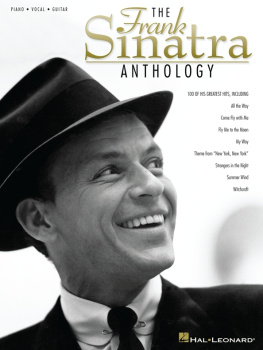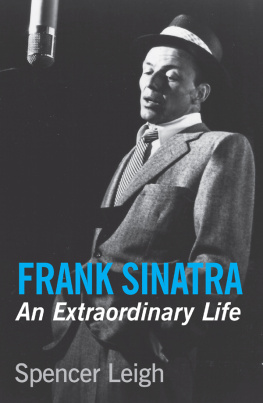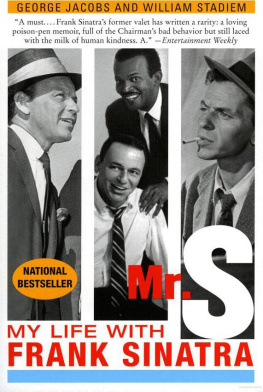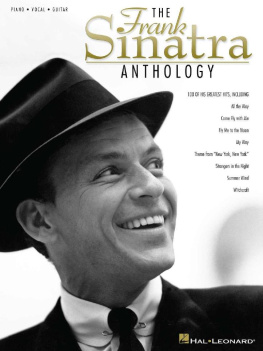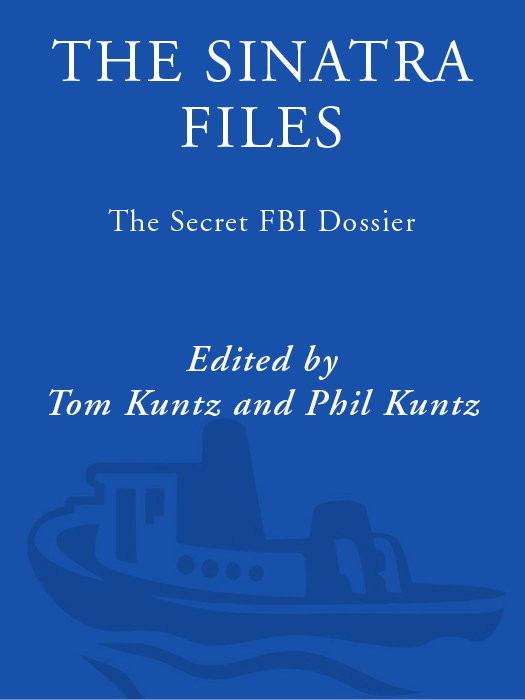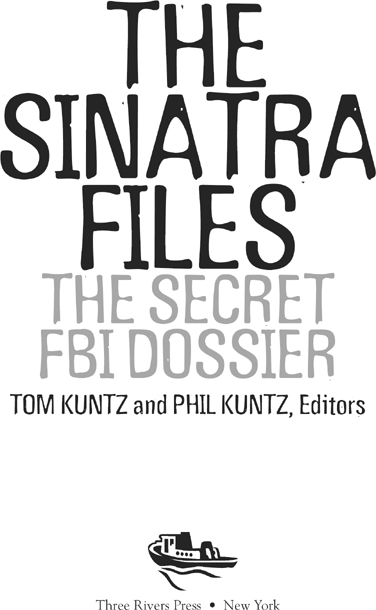Also by the Editors
The Titanic Disaster Hearings edited by Tom Kuntz
The Starr Report introduction by Phil Kuntz The Starr
Report: The Evidence edited by Phil Kuntz
The Starr Evidence edited by Phil Kuntz
To our parents, the late John J. and Madeleine M. Kuntz
Tom Kuntz and Phil Kuntz
To my wife, Tracy
Tom Kuntz
CONTENTS
Introduction
When he died on May 14, 1998, Frank Sinatra was one of the most chronicled celebrities of modern timesthe focus of oceans of ink and miles of film and video footage at turns serious-minded, celebratory, or mean-spirited.
But one detailed record of his life, taken from a uniquely penetrating perspective, became fully public only after his death: the Federal Bureau of Investigations extensive files on the singer and screen star. Most were compiled over the course of several decades under the watchful eyes of J. Edgar Hoover, as his agents investigated whether Sinatra was a draft-dodger, a Communist, or a front for organized criminals.
Released in December 1998 in response to requests under the Freedom of Information Act, the 1,275-page dossier is a trove of insights into Sinatras life, his turbulent times, and, perhaps most important, the Hoover-era FBIs invasive and at times almost voyeuristic ways.
Although Hoovers FBI kept files on other celebrities, few were as voluminous, for no other subject was as enduring or controversial. For more than five decades, Sinatra was a major force in American society and popular culture, a politically active, hard-partying star who associated with powerful figures in both the underworld and at the highest levels of government through every important turn in the latter half of the twentieth century. The Sinatra FBI files offer themselves as an allegory of the American Century and its obsessions.
Extensive excerpts from them are published here for the first time. Along with a limited number of historical documents from other sources, the files have been organized and supplemented with explanatory notes to put them in context and to highlight their revelations.
Taken together, they invite a reassessment of the entertainer. Revelations abound. includes evidence suggesting an unholy alliance between press muckrakers and the FBIs star-obsessed top brass, who occasionally helped favored journalists seeking dirt on Sinatra. This new material lends credence to Sinatras lifelong grudge against the press.
offers a disturbing glimpse into the red-baiting 1940s and 1950s, when Sinatra was unjustifiably, in his words, tagged [as a] commie. Though for a time he stood by other embattled Hollywood stars caught up in the paranoia, he became so sensitive to the charges that, according to an intermediary, he volunteered to become an undercover snitch in the FBIs hunt for subversives. Hoover turned him down. So did the army years later, when Sinatra offered to entertain American troops in Korea.
In some key instances, what isnt in the files is as important as what is.
For example, although excerpts in and elsewhere assiduously note Sinatras interactions with notorious hoodlums, the FBI gathered no evidence that mob pressure landed him his Oscar-winning role as the pugnacious Private Angelo Maggio in From Here to Eternity in 1953. This canard is so embedded in the popular imagination that it is assumed to be the inspiration for a scene in The Godfather in which a severed horses head in a movie moguls bed ensures a plum role for an Italian-American singer. Nor do the files support the widely held assumption that the mob in 1942 strong-armed Tommy Dorsey into releasing Sinatra from a contract that entitled the bandleader to 43 percent of the singers earnings for life.
detail how the FBI director, with little subtlety, made sure each successive politician who befriended the popular singer knew exactly how much derogatory information the FBI had on their friend.
John F. Kennedys recklessness is by now well documented, but the files dry bureaucratic account of the president consorting with associates of the very mobsters his brother the attorney general was trying to imprison will startle even the best-read Kennedy aficionados.
There also are moments of unintentional humor, as in the case of the straight-faced FBI memo that says, Sinatra denied he sympathized with Lenin and the Marx brothers. And the capitalized names of Marilyn Monroe, Tony Bennett, and other celebrities leaven the G-mens reports like the boldface type of gossip columns.
The files also shed light on the evolving nature of Sinatras relationship with the FBI: He eventually joined with his would-be pursuers in the bureau in a mutually respectful common cause, when Sinatras son was kidnapped in 1963.
In sum, the files track an iconic career whose arc seems to personify postwar Americas loss of innocence: Sinatras evolution from liberal, idealistic crooner to sophisticated, sexually liberated swinger to jaded Las Vegas headliner and friend of Republican presidents.
Was the scrutiny unfair?
The FBI twice seriously considered prosecuting Sinatra, once for denying that he was a Communist and once for denying that he par-tied with a mobster. But despite coast-to-coast investigations, the FBI couldnt make a case against him.
Sinatras problem throughout his career was that he never did much to remove the taint of guilt by association, especially with the mob. Judged by the company he kept, Sinatra kept inviting more scrutiny. The FBI obliged, and its files grew until the singer became, as the journalist Pete Hamill put it, the most investigated American performer since John Wilkes Booth.
But in many ways Sinatra wasnt so unique as a subject of FBI interest. The agency kept files on thousands of people, famous and otherwise, whenever they figured in investigations, no matter how tangentially.
According to Hoovers longtime deputy director, Cartha D. Deke DeLoach, the main FBI dossier on someone like Sinatra wouldnt have been kept in the agencys collection of Central Files, which were open to virtually anyone in the bureau. Instead, most of the Sinatra material would have ended up in the Official and Confidential files of well-known people, which were located in Hoovers suite in two small filing cabinets behind the desk of his secretary, Helen Gandy.
There was nothing sinister in this, DeLoach maintains. In his 1995 memoir, Hoovers FBI: The Inside Story of Hoovers Trusted Lieutenant, DeLoach writes: The purpose of keeping the O&C Files in an area of limited access was to protect the privacy of those about whom information had been gathered, not to maintain secret records for the purpose of blackmail.
Many a Hoover chronicler would disagree with DeLoach about the sanctity of his bosss motives, but what is undeniable is that the director often took a personal interest in the minutiae of Sinatras life. Readers of these pages can judge for themselves why.
The FBI began compiling the dossier during one of the most charged moments in American historythe 1940s. From the start of the Second World War, Sinatras rise to fame stirred an incredible amount of resentment and envy. The crooning heartthrob was thrilling millions of bobby-soxers, and making millions doing it, while avoiding the fate of the hundreds of thousands of other young men who forwent love and fortune to fight European fascism and Japanese imperialism.


